QuestionI have had two rats for about a year. Bought from a small pet shop in a bad area of town. Both male. Wiley Rat & Rufus. I feed it Rat Nuggets from Pets at Home and just about anything that we eat in our household that they like. I try to avoid giving them too much protein. They eat a lot of fresh fruit and veg. They are half dumbo rats apparently. Brothers.
About a month ago I noticed Wiley sneezing. I thought it was an allergy to disinfectant so changed it. Still kept sneezing. Over next couple of weeks Rufus' heartrate (or what I thought was his heartrate) seemed to be increasing. Wiley has red stuff around his nose and eyes (I assume to be porphyrin), has put on a bit of weight and has not gone off his food. Wiley seems very subdued and unsociable. Is only interested in food. Rufus has lost a LOT of weight. He is now half the size of Wiley. He is very active most of the time but sometimes just sits on the top of his igloo for ages eyes open gasping for breath. He is not terribly interested in food.
I took them to the vet down the road last week and she prescribed them Baytril. A much larger dose for Wiley as he is so much bigger. Wiley seems to have recovered. He is not sneezing AT ALL anymore. Which is great news. But Rufus is showing absolutely no improvement. My brother thinks he is improving a tiny bit but I think he has got worse. I have had to remove most of their food from their cage just to make sure they are eating their antibiotics. But Rufus has started to wise up to it and is just eating the clever disguise I hide it in and not all of the antibiotics. I am feeding it to them soaked into bread with honey or peanut butter on it. At first I thought Rufus' chest was moving so fast because of his heart but the vet tells me it is his lungs. I can't understand how he can breathe with his chest moving so fast. I am VERY VERY concerned. The vet down the road was already talking of having him put down if the antibiotics don't work as she suspects he may have chronic pneumonia or a tumour in his lungs. The thought of having him put down is killing me. I have booked them both in to see one of the best vets in Surrey instead of the one down the road. Want to make sure he gets the best treatment and a second opinion might put my mind at rest a little. I am questioning whether it could have been something I have done wrong to lead to his illness. Do you have any idea what could be wrong with him or any advice please? I am frantic with worry. He is such a lovely rat and has the gentlest personality you would ever come across. He really is a little angel. Please help me.
Thanks,
Kate
AnswerHi Kate
First of all, I am so sorry your having these issues. Unfortunately, respiratory problems are very common in rats since they are born with an organism called mycoplasmosis. If the rat is not bred for health which unfortunately, most pet store rats are not, a rat with a weaker than normal immune system seems to suffer from chronic mycoplasmosis infections that is causing respiratory infections. Myco is the same organism that causes TB in humans, but don't worry, it is species specific and there is NO WAY humans can catch it from rats. However, with chronic respiratory infections, unfortunately, this leaves the lungs more and more damaged with scarring and sometimes blistering of the lungs occur as well. It is very common to also see emphysema develop as a result of chronic attacks and also, heart disease can develop. Usually, heart and lung disease are seen together in rats as lung disease, or COPD, progress.
This does not mean, however, that your rat is going to die right away because from what I have read, the only treatment he has had so far was a round of baytril. I believe firmly in going the extra mile, as I see that you do too, and try to resort to every route possible first to give the rat a chance to live his already too short life.
Baytril and doxycylin combo seem to work very well in attacking myco. There are few drugs that will work on myco because the organism has no cell wall, and most antibiotics are made to attack the cell wall. However, the culprit isn't always myco. Often, it is a secondary infection and sometimes baytril is not the right drug. I would suggest adding another antibiotic too. The rule of thumb is if the medication is not showing to work within 3 days, its time to switch. That is plenty of time to start to work on an infection. Time is against the rat since usually by the time they show signs of illness they are pretty sick. Rats are fantastic at hiding illness mainly due to the fact that they are on the bottom of the food chain and need to be strong so they are not victim to predators.
The rat should be kept at the vets in my opinion, in oxygen while he is being treated aggressively with the new medication. Using a nebulizer for antibiotics is also known to work fast when dealing with aggressive infection. Other medications can be used as well,which of course is up to the vet, but the rat can receive steroids to help with inflammation in the lungs, lasix if there is fluid around the heart or lungs, albuterol to help open the rats airway and help him breathe better. Heart disease should be ruled out as well. Enalapril is a good drug to use as a diagnostic tool when heart disease is suspected. The drug itself is benign and if there is no heart disease present, enalapril will NOT harm the rat if he did not need it. Also, anti anxiety drugs such as valium can be administered up to three times a day to help with anxiety due to breathing difficulties. All of the medications I am suggesting are safe for rats when prescribed correctly and have all been used to help treat severe lung disease and infection with great success. Among the antibiotics I prefer to be used as an aggressive treatment for no more than 3 days would be gentocin something in that family. This will also conquer dangerous strep bacteria as well.
All of the drugs I mention can be prescribed to take home with the exception of the gentocin since its used most often via injection but also should be used short term only.
Also, once the rat gets stable, which hopefully he does, please write back and we can discuss changing their diet. You can also refer to my website which is listed on my profile, which I discuss proper diet for rats. This is key to good health as well. Also, a word of caution on the peanut butter. Always make sure it is thinned out with water or some other vehicle you use, because it is very thick and can clog the rats airway, causing him to choke, and sometimes it can be fatal. I have seen that happen to clients rats before and its just....terribly sad.
Also, keep a close eye on both rats. Rats tend to seek higher ground with having problems getting enough oxygen. They lay on top of their hidey houses and igloos and tend to shy away from confining hammocks and rat piles. You may even catch your rat laying on a top shelf or balcony with his head hanging over the edge. He may sleep like this or just lay and rest this way too. They also seek this type of position to help with oxygen as well. We know our rats better than the Vet, so its best to note any changes in behavior and share it with the vet during your visit.
An exotics specialist is your best bet when dealing with rats. Although they are not "exotic" animals, they are uncommon as pets so they sort of fall into that category. Actually as we both know they are VERY COMMON as pets, and make great pets too...but sadly, general vets with a traditional practice tend to know very little about these critters because lets face it, not everyone is willing to go that extra mile or two and spend the extra money it takes to get your rat to the vet and get he or she on the road to recovery again.
I hope this helps. Its so frustrating when dealing with respiratory issues because it is scary for both the rat and his owner to see them going through this.
If, after all avenues of treatment have been exhausted and the rat continues to have failing health, the most humane thing you can do, as you know, which I call the greatest give of love, is to have him humanely euthanized properly and gently by a qualified vet so he can be free of illness and become your guardian rat angel.
Please let me know how it goes. Feel free to contact me any time.
Sandra Todd

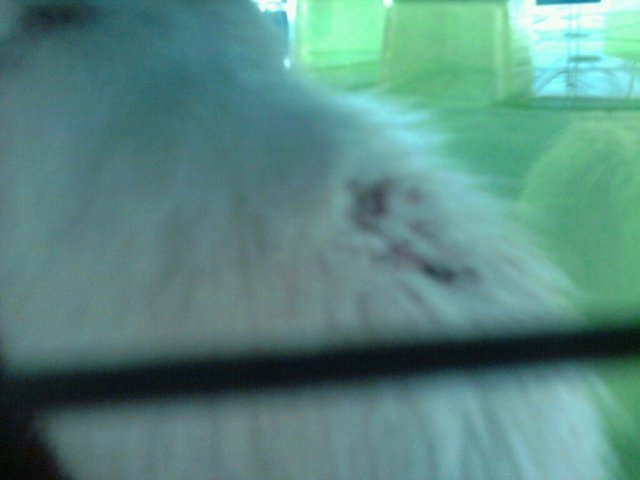 My rats bad scratches
Question
My poor rattie
My year old male rat has myster
My rats bad scratches
Question
My poor rattie
My year old male rat has myster
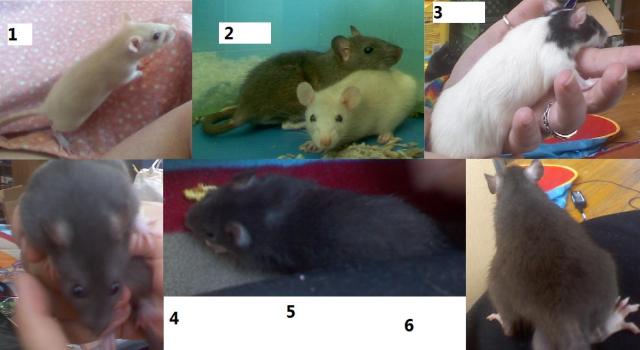 Rattie Colors
Question4 new babies
QUESTION: Hi, I was wonderi
Rattie Colors
Question4 new babies
QUESTION: Hi, I was wonderi
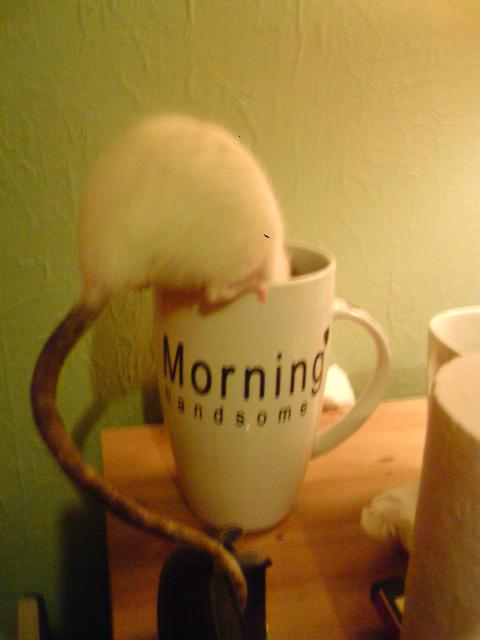 Problem w/ back feet on female dumbo rat
QuestionQUESTION: Hello Sandra,
I am looking for some
Problem w/ back feet on female dumbo rat
QuestionQUESTION: Hello Sandra,
I am looking for some
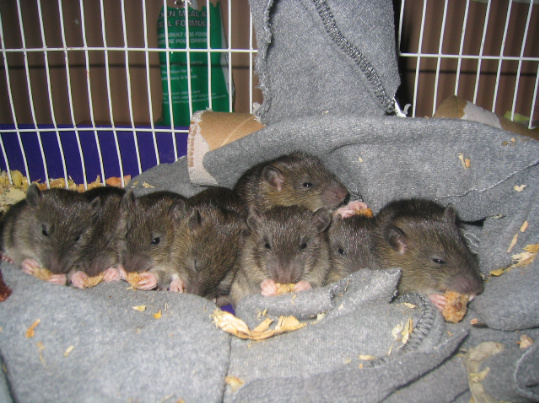 Cat gave me a present this morning...
QuestionQUESTION: Dear Sandra,
Well, the subject says
Cat gave me a present this morning...
QuestionQUESTION: Dear Sandra,
Well, the subject says
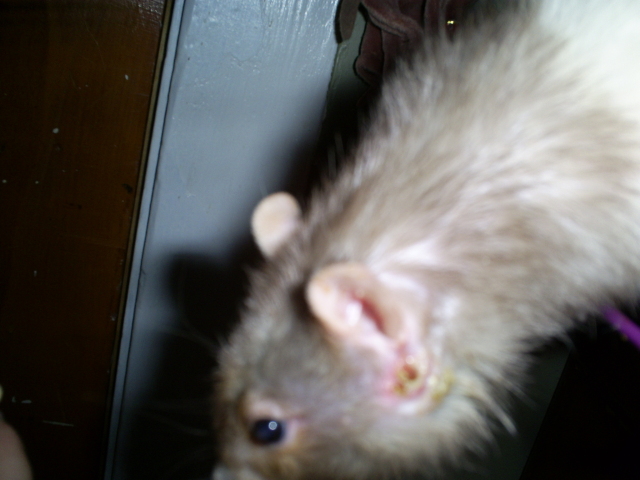 Tooth abcess or other?
QuestionQUESTION: My rats ear kept looking like he scra
Tooth abcess or other?
QuestionQUESTION: My rats ear kept looking like he scra